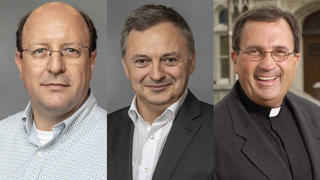Visiting Jesuits Bring Ignatian Approach to Important Topics
Three members of the Society of Jesus — Manuel Hurtado Duran, S.J., Janez Perčič, S.J. and Kevin Wildes, S.J. '76 — joined the SJU community this past summer, bringing with them a wealth of expertise in timely topics.
 L to R: Hurtado, Percic, Wildes
L to R: Hurtado, Percic, Wildes
Three members of the Society of Jesus — Manuel Hurtado Duran, S.J., Janez Perčič, S.J. and Kevin Wildes, S.J. '76 — joined the SJU community this past summer, bringing with them a wealth of expertise in timely topics.
Hurtado, who serves as the Donald I. MacLean Chair, joins SJU from the Bolivian Catholic University in Cochabamba. He presented a lecture this fall on the Law of the Rights of Mother Earth, a piece of legislation passed in Bolivia that grants inherent rights to Earth to protect it against the effects of human activities that harm the environment.
Hurtado sees a direct connection between the law and Jesuit philosophy.
“I believe that the Ignatian intuition of ‘finding God in all things’ enables us to consider God existing in every single one of his creatures,” he says. “In this spirituality, we undoubtedly have a good reason to seriously consider that God somehow labors on our behalf in our Mother Earth.”
Hurtado plans to deliver a second lecture in the spring semester, with date and time to be announced.
Perčič, a University Professor, has already made use of his time at Saint Joseph’s, completing and publishing an English edition of “Major Jesuit Thinkers,” a book he wrote with Johannes Herzgsell, S.J. The book introduces nine visionary Jesuits, including Bernard Lonergan, who is honored in the name of SJU’s Barbelin / Lonergan Hall.
“These priests succeeded in their own time by absorbing the discoveries and developments of modern philosophy and science in order to reconcile them with the Christian tradition,” Perčič explains. “Their original and visionary ideas are meant to awaken the curiosity of present-day readers, prompt them to ask further questions, and inspire them in their own pursuit of truth.”
Wildes, an alumnus, associate trustee and former president of Loyola University New Orleans, also serves as University Professor. He will teach business ethics in the spring while working on a book on organizational ethics in healthcare.
“Here is a visual for the problem: There are several Norman Rockwell paintings which have a patient and a physician together in the physician’s office,” he explains. “Most people think that that is still the way it is, but it’s not. In addition to the patient and the physician there are many other organizations and entities that enter the conversation, and the physician-patient interaction is bounded by agreements that these other entities have made. The questions I want to examine are how do we get these other organizations into the ethical conversation.”
